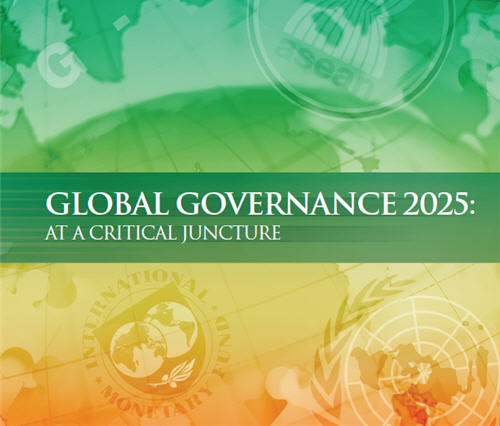Global Governance?
We need global cooperation to deal with a growing variety of serious problems. But we can't even agree amongst ourselves on policy options.
This morning, the Atlantic Council hosted the launch of Global Governance 2025: At A Critical Juncture, a report following a long collaboration with several partners. The fundamental takeaway is that, while cooperation between the United States and Europe is essential, it “is no longer enough to effectively manage global challenges.” Instead, key players from around the globe will need to develop new institutions to deal with the world’s problems.
In my first post on the report, “Global Governance: Vital But Impossible?” I take a skeptical view of the feasibility of the recommendations.
And, yet, while the need for cooperation seems obvious, the prospects for achieving it seem bleak.
It’s true that the surging power of China, India, Brazil, and others means that they deserve a seat at the “big table.” But it should be recognized that, while transatlantic consensus on dealing with the big issues is inadequate, it also hasn’t been achieved, despite the fact that we “share fundamental values and strategic interests to an extent not matched by any other partners in the world.” Figuring out how to do that while also getting the cooperation of players with very different values and strategic interests is going to be a neat trick, indeed.
And that’s not to mention, as was noted many times by the report’s primary authors at the launch event, the lack of domestic consensus even within the West. We’re in the midst of a global recession (albeit, one that technically “ended” last summer in the United States) and face polities that are turning inward, demanding solutions to short term issues like jobs and out-of-control budgets. The mood for ambitious global projects is, to say the least, not apparent.
Much more at the link.







This is a subject to which I’ve returned frequently at my place over the years. Government requires consensus and I don’t believe there’s enough consensus in the world around which global government could be built. As one indicator of that consider the Universal Declaration of Human Rights.
The UDHR is 62 years old now and in theory it should be obligatory to all members of the United Nations. It isn’t. Practically every member country of the UN rejects one or more of its articles (including the United States). Enough countries have rejected enough articles that there are competing declarations, expressing differing views of what constitutes fundamental rights.
The financial crisis highlighted the reality that the various international institutions do not have the tools to govern international finance adequately. To my mind this presents several alternatives: proscribe international finance; create the tools to control international finance adequately (which would interfere with national sovereignty); tolerate an international financial system beyond the control of international institutions (which seems problematic to me).
There are a number of other areas in which the tools currently available are clearly inadequate. Two come immediately to mind: air and water pollution and the treatment of ungoverned territories. Air and water pollution are not confined within national borders but the tools for dealing with them internationally are too weak to be suitable to the task.
Practically all of the serious problem areas of the world are territories that while nominally under the control of one sovereign country or another in fact are outside that country’s control. They are in fact ungoverned areas. Those areas include much of Afghanistan and the FATA of Pakistan.
Governance nearly always drops to the lowest common denominator, do we really want to see that happen, and have the whole world become colonized by some organization like the U.N.?
Managing the non-democratic rogues and cowboys in the world by creating a democratic super-institution is clearly a fool’s goal: look at the UN and the EU! Then too, creatiing a “club” of big nations to exercise control over the ungainly and unprincipaled lot of nations is likewise foolhardy, and decidedly undemocratic. The world is not ready for a central super-government with the power to enforce its decrees, and we would be more than foolish to champion such a move; we would be acting against, or even more strongly, violating, the well-being and the wishes of our own citizens, our Constitution, and our sovereignty.
It is obvious that among the “club members” would have to be China, Russia, Indonesia, Saudi Arabia, India and Iran, which is a collection of nations that have little regard for the US or for international government, unless, perhaps, it is they that govern. Two blocks of nations stand in the way as well: the Africans and the Islamic nations, that tend to vote as blocks. The idea that all nations can be treated as sovereign individuals over which we can impose a strong government along the lines of republicanism (or even blatantly totalitarian, in the end!) is not only dangerous to us, but also impractical and immoral on the face of it! We cannot seem to stop nuclear proliferation today, despite the best intentions and commitments of major nations, and I seriously doubt we will be able to tomorrow, either.